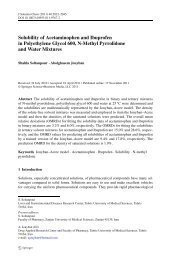new insights into the prevention and treatment of bulimia nervosa
new insights into the prevention and treatment of bulimia nervosa
new insights into the prevention and treatment of bulimia nervosa
You also want an ePaper? Increase the reach of your titles
YUMPU automatically turns print PDFs into web optimized ePapers that Google loves.
Interpersonal Problems in People with<br />
Bulimia Nervosa <strong>and</strong> <strong>the</strong> Role <strong>of</strong><br />
Interpersonal Psycho<strong>the</strong>rapy<br />
Jon Arcelus1,2, Debbie Whight1 <strong>and</strong> Michelle Haslam2 1Leicestershire Partnership NHS Trust, Leicester,<br />
2Loughborough University Centre for Research <strong>into</strong> Eating Disorders (LUCRED),<br />
Loughborough University,<br />
UK<br />
1. Introduction<br />
The term ‘interpersonal’ encompasses not only <strong>the</strong> patterns <strong>of</strong> interaction between <strong>the</strong><br />
individual <strong>and</strong> significant o<strong>the</strong>rs, but also <strong>the</strong> process by which <strong>the</strong>se interactions are<br />
internalised <strong>and</strong> form part <strong>of</strong> <strong>the</strong> self-image (Sullivan, 1953). Interpersonal functioning is<br />
considered crucial to good mental health. According to Klinger (1977), when people are<br />
asked what makes <strong>the</strong>ir lives meaningful, most will mention <strong>the</strong>ir close relationships with<br />
o<strong>the</strong>rs. Being involved in secure <strong>and</strong> fulfilling relationships is perceived by most individuals<br />
as critical to wellbeing <strong>and</strong> happiness (Berscheid & Peplau, 1983).<br />
Maladaptive interpersonal functioning is considered central to several psychiatric disorders,<br />
such as depression (e.g. Petty, et al, 2004), anxiety (e.g. Montgomery et al, 1991),<br />
schizophrenia (e.g. Sullivan & Allen, 1999) <strong>and</strong> autistic spectrum disorders (e.g. Travis &<br />
Sigman, 1998). Interpersonal skill deficits may cause vulnerability to developing mental<br />
health problems <strong>and</strong> may also play a role in maintaining it. This is <strong>the</strong> chicken <strong>and</strong> egg<br />
question: are interpersonal problems vulnerability factors for <strong>the</strong> development <strong>of</strong> a<br />
psychiatric disorder or are <strong>the</strong>y <strong>the</strong> result <strong>of</strong> this disorder?<br />
2. Interpersonal problems <strong>and</strong> eating disorders<br />
Considering that unhealthy interpersonal functioning is central to several mental health<br />
problems, it is not surprising that evidence suggests this is also <strong>the</strong> case in eating disorders.<br />
Walsh et al (1985) demonstrated a high frequency <strong>of</strong> affective disorder, particularly major<br />
depression, among patients with <strong>bulimia</strong> <strong>nervosa</strong> (BN), which may explain <strong>the</strong> strong<br />
correlation found between this disorder (BN) <strong>and</strong> interpersonal problems (Hopwood et al,<br />
2007). Research in this area have found that people suffering from BN were more likely to<br />
display domineering, vindictive, cold, socially avoidant, non-assertive, exploitable, overly<br />
nurturing, or intrusive characteristics than non-BN (Hopwood et al, 2007).<br />
Social support <strong>and</strong> social networks have also been studied in people with BN. Grisset <strong>and</strong><br />
Norvell (1992) found that people with BN reported receiving less emotional <strong>and</strong> practical<br />
support from friends <strong>and</strong> family. They argue that this inadequate support creates a<br />
1














![focuspdca.ppt [Compatibility Mode]](https://img.yumpu.com/22859457/1/190x146/focuspdcappt-compatibility-mode.jpg?quality=85)


